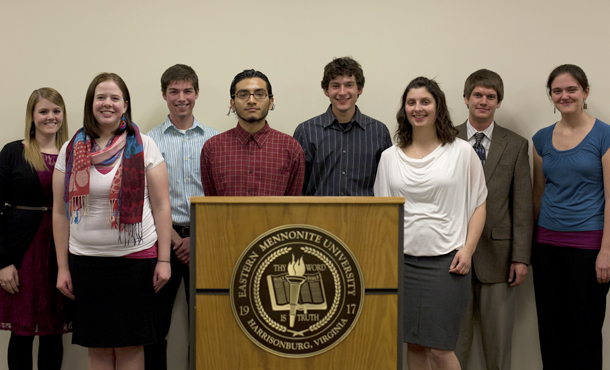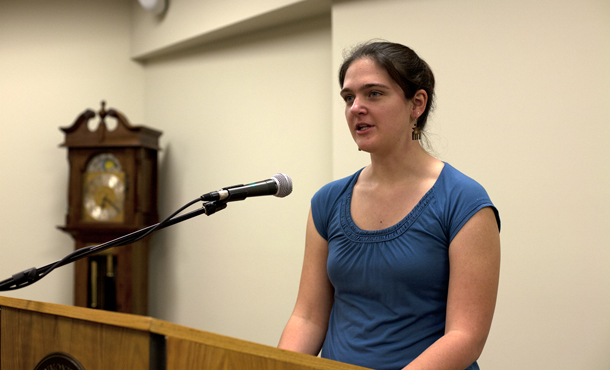Peace and the U.S. presidential election would not seem to be partners, yet an Eastern Mennonite University student made a winning case for joining them during the annual C. Henry Smith Oratorical contest.
Emily Harnish, a senior biochemistry major from Strasburg, Pa., won first place with her speech, “Lessons from the hymnal in an election season.” In her speech, Harnish explains her anger over the non-peaceful manner of politics during the 2012 election and how the hymn, “Let All Mortal Flesh Keep Silence,” made her think about peace in a new way.
“When I remember that my citizenship is in heaven, I am able to look past disagreements about politics,” said Harnish.
“When I take seriously the hymn’s command to give Christ all reverence and honor, I am able to move closer to living in peaceful relationships with my neighbors. This first stanza helped me understand that peacebuilding requires humility, that humans have limits, and that peace and wholeness come from something outside of humanity. It reminded me to keep silence, to be slow to speak, and slow to become angry.”
As a first-place winner, she will receive a cash prize and entry in the bi-national competition with winners from other Mennonite colleges and universities in the United States and Canada.
Rebekah Enns, a senior history major from Winnipeg, Manitoba, was one of two runners-up with her speech, “Language as Lived Reality: Developing a Discourse of Peace.” Enns discussed the power of words to “legitimize and delegitimize violence and to build societies of peace.”
“At least 43 percent of American Muslims undergo some form of discrimination or violence because of their religion every year. And while they only make up one percent of the American public, American Muslims are victims of 13 percent of hate crimes in the U.S.
“Through discourse, we, us, everyday people have the power to create systems of peace.”
Josh Kanagy, a senior psychology major from Timberville, Va., was the other runner-up with his speech, “Molding Peace Within: Reflections of a Recovering Workaholic.” Kanagy restructured his daily schedule to match his priorities, “refraining from responsibilities that overwhelmed me.”
“There’s nothing heroic about suffering alone. As illustrated by Thomas Merton, ‘This is about more than self-care, this is about molding yourself and your environment to support your capacity to thrive.'”
Kanagy urged those in attendance to, “Seek your passion, your freely chosen task.”
C. Henry Smith Oratorical Contest
The annual oratorical event, open to students in Mennonite and Brethren in Christ universities and colleges in Canada and the United States, is administered by Peace and Justice Ministries of Mennonite Central Committee (MCC) U.S.
Each speaker applied the Christian peace position to a contemporary concern in an 8-10 minute address.
The contest was established in 1974 in honor of the late C. Henry Smith, a Mennonite historian and professor at Goshen College and Bluffton University.
Other 2013 contestants
- Corben Boshart, “Seeking Unity in the Mennonite Church”
- James Souder, “Redistributing Food, An Opportunity for Peace”
- Jossimar Díaz-Castro, “A Christian, Democratic Immigrant Witness & Participation Today”
- Mariah Elliott, “Are You Who You Say You Are?”
- Taylor Waidelich, “Restoring Justice to Educational Discipline”
Listen to the C. Henry Smith Oratorical contest…

